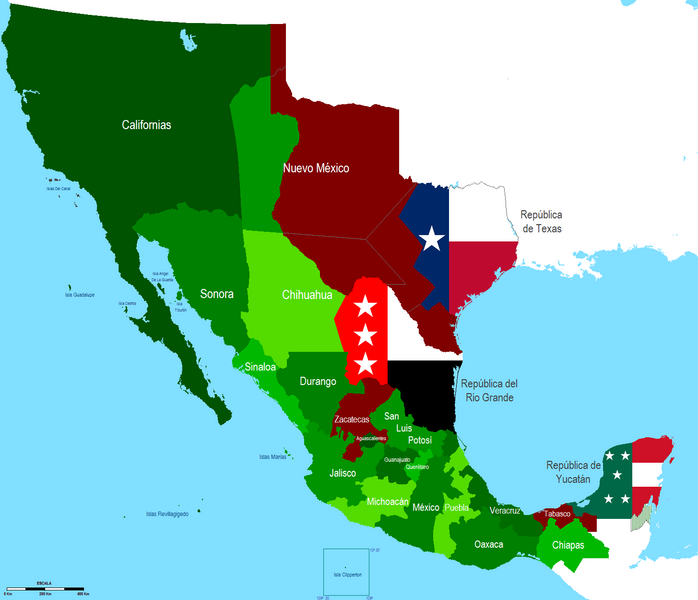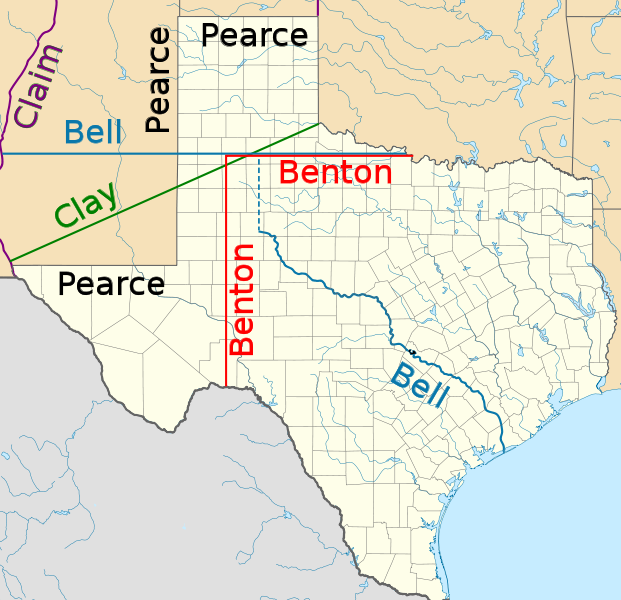The only reason EL Paso is in Texas and not New Mexico was punishment for not accepting the Republic of Texas as their sovereign country. When Texas won it's independence from Mexico the Hispanic citizens of El Paso told the Texas Government to take a hike. Just like Santa Fe and Albuquerque. They jailed, killed, or sent to Mexico any Texas Officials or Representatives who dared show up.
When Texas was annexed as a state the powers that negotiated the annexation treaty insisted that El Paso be made part of the State of Texas. Logically it should have been part of New Mexico. The Texas Officials were vindictive. They said if El Paso would not accept Texas as their Country then by-god they were going to accept Austin as their State Capital. After that the next time Texas Officials showed up they were under the protection of the US Calvary.
Fake, made-up "history." Monumental load of crap. Ben Procter is turning in his grave.
Under the Mexican Constitution of 1824,El Paso (previously a part of Spanish Coahuila) became part of the
Territario de Coahuila y Texas. Under the both Spanish and Mexican rule, the
Territorio de Santa Fe (New Mexico) never included El Paso.
When Texas won its independence in 1836, the instrument of surrender signed by Santa Anna recognized the Rio Grande as the southern border of Texas. This at least officially transferred El Paso from the jurisdiction of Coahuila to that of Texas. Texas never sent any officials or representatives to El Paso, so it follows that none were ever jailed, killed, or sent to Mexico. El Paso never told Texas to take a hike because El Paso was going about its business as an autonomous area. It was far too remote from the rest of Texas and from the New Mexico government in Santa Fe for either government to exercise effective control over the region -- just as it had been too remote for Coahuila to exercise effective control. There was no vindictiveness either in El Paso or Texas proper because there was nothing to be vindictive about, since they had little to no contact wit each other.
Austin didn't enter into the picture at all because that city didn't even exist yet. It wasn't founded until 1839. The site of Austin was chosen because it was a convenient crossroads to facilitate trade between Santa Fe and Galveston (Santa Fe's nearest major port) and sat astride the major routes between northern Mexico and the United States.
When Texas became part of the United States in 1845, there was no "treaty of annexation." The legal instruments that effected the transfer of Texas to the United States were a joint resolution of the US Congress (February 1845) followed by a corresponding act by the Texas Congress (December 1845). Texas delayed accepting the US invitation for 10 months while it toyed with offers of friendship from Great Britain to get more favorable considerations from the United States, which did not want the British to get a further foothold on the North American continent. Britain and the United States were still great rivals and sometime enemies at the time.
During the period in which the Texas Revolution occurred, other parts of Mexico were also in revolt. Zacatecas revolted May 1835, at almost the same time Texas did. Santa Anna quickly and brutally crushed that revolt, awarding his soldiers a two-day pillaging spree in the city of Zacatecas, in which 2,000 citizens were killed. Tabasco revolted in 1836, but Santa Anna snuffed it before a provisional government could be formed to declare independence. Nuevo Leon, Coahuila, and Tamaulipas declared independence in 1840 and federated themselves as the Republic of the Rio Grande. Yucatan declared independence in 1841 as the Republic of Yucatan. Texas was the only Mexican province to make its revolution stick and win permanent independence.

When Texas was negotiating to enter the American Union throughout most of 1845, its western boundary was still ill-defined. It was hazily recognized as the Rio Grande, but how far north did that western boundary extend? Since 1836, Texas had claimed that it extended all the way to the river's source in southwestern Colorado. It was an audacious claim because it included not only El Paso, but Albuquerque and Santa Fe. El Paso had at least been officially recognized as part of Texas, but Albuquerque and Santa never had. In fact, no part of Texas had ever been considered to extend that far north.
But Texas audaciousness didn't end there. At the sources of the Rio Grande and Arkansas rivers, there was a vertical strip of land that extended northward through western Colorado into south-central Wyoming. It was a no-man's land, an undefined part of the boundary beetween Spanish and American lands delineated in the Adams-Onis Treaty of 1819. Since nobody had clear title to it, Texas claimed it. The claim had no legitimacy, but neither did the claims of Mexico and the United States.

The Texas boundary question was taken up as part of the Compromise of 1850, the landmark legislation whose principal aim was to delineate free and slave territories in the western United States. Four different plans were proposed for Texas' northwestern boundary, each named for the member of Congress who sponsored it. Recognizing prior Texas claim to El Paso under Santa Anna's surrender terms, three of the four plans included El Paso as part of Texas. The plan of Maryland Representative James Pearce was eventually adopted.
As for all this nonsense about El Paso resisting Texas and Texas vindictively forcing its will on El Paso, backed by US military force, it never happened. Indeed, since Texas was an up and coming power at the time, most El Pasoans had no real objection to being included. It held much more promise than being transferred to New Mexico, which was still a remote backwater then.





